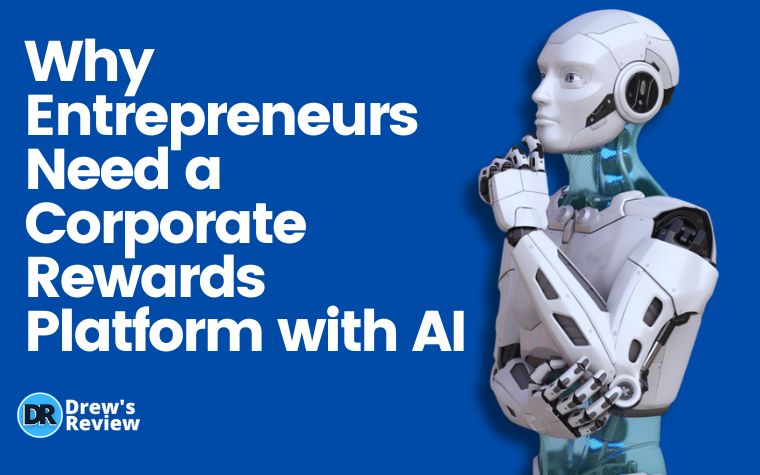
In today's competitive business landscape, entrepreneurs face the tough challenge of attracting and retaining top talent. As companies big and small vie for the same pool of skilled professionals, traditional approaches to employee recognition often fall flat.
This stark difference highlights why modern entrepreneurs need smarter systems for recognizing employee contributions.
The gap between outdated manual reward programs and what today's workforce expects has never been wider, creating both a challenge and an opportunity for forward-thinking business leaders.
Transforming Employee Recognition Through Intelligent Technology
The world of employee recognition has evolved dramatically in recent years. Smart entrepreneurs recognize that a corporate rewards platform with AI capabilities offers advantages that traditional programs simply can't match.
From Paper Certificates to Predictive Rewards
Remember when employee recognition meant a certificate and a handshake? Those days are long gone. Today's workforce expects personalized appreciation that reflects their unique contributions and preferences.
Traditional reward systems typically follow a one-size-fits-all approach, offering standardized rewards based on arbitrary milestones. These systems often miss the mark because they fail to consider individual preferences and motivations.
AI-powered platforms, on the other hand, analyze patterns in employee behavior, performance data, and even feedback to create highly personalized recognition experiences. They can predict which types of rewards will resonate most with specific team members, making recognition far more meaningful.

The Data Revolution in Entrepreneurial Decision-Making
Data has become the lifeblood of modern business, and employee rewards programs are no exception. Entrepreneurship and rewards have become increasingly intertwined with data analysis.
Smart entrepreneurs use AI-driven insights to understand exactly what motivates their teams. Rather than guessing what might work, they can make decisions based on concrete data about what actually drives engagement in their specific organization.
This shift represents a fundamental change in how business leaders approach team motivation—moving from intuition-based decisions to data-informed strategies that deliver measurable results.
Game-Changing Benefits of AI in Employee Recognition
Implementing an AI-powered employee rewards program offers entrepreneurs powerful tools to boost both satisfaction and business outcomes. Through hyper-personalization at scale, AI tailors rewards to individual preferences—even in large organizations—by analyzing subtle patterns and creating micro-segments within the workforce. Unlike static systems, AI-driven platforms evolve over time, adjusting rewards based on real-time feedback, current performance, and company milestones.
Most notably, these platforms leverage predictive intelligence to identify early signs of employee disengagement, such as shifts in communication or productivity. This enables timely, proactive interventions that re-engage staff before issues escalate. By flagging potential disengagement in top performers, businesses can focus retention efforts where they matter most, fostering a more motivated, loyal, and high-performing team.
Maximizing ROI While Minimizing Effort
For entrepreneurs juggling countless responsibilities, the efficiency benefits of AI in business cannot be overstated, especially when applied to employee recognition.
Automated Distribution and Tracking
One major challenge with traditional rewards programs is the administrative burden. AI systems automate many aspects of program management, saving entrepreneurs valuable time.
Set-and-Forget Recognition Workflows
Once initial parameters are established, AI systems can autonomously identify recognition opportunities, distribute appropriately scaled rewards, and track everything without constant oversight.
Intelligent Budget Management
AI helps entrepreneurs get maximum impact from their recognition budget by allocating resources toward the reward types and moments that data shows will have the greatest effect on engagement.
Analytics Dashboards for Quick Decisions
Rather than wading through spreadsheets, entrepreneurs get clear visualizations of program performance, allowing for quick, informed decisions about their recognition strategy.
Building a Strategic Roadmap for Implementation
Implementing an AI-powered rewards platform requires thoughtful planning. Here's how entrepreneurs can approach this transition strategically.
Assessing Your Organization's Readiness
Before diving in, it's important to evaluate whether your company is prepared to implement an AI-powered rewards system.
Data Infrastructure Requirements
AI systems need data to function effectively. Assess your current systems to determine if you're capturing the right information about employee performance, preferences, and engagement.
Cultural Readiness Evaluation
Consider how your team currently perceives recognition. A company culture that already values appreciation will adapt more easily to a sophisticated rewards platform.
Budget and Resources Assessment
Be realistic about what you can invest in terms of both money and time for implementation. Even the most powerful platform requires proper implementation to succeed.
Selecting the Right Platform for Your Business Stage
Not all AI-powered rewards platforms are created equal, and entrepreneurs should choose one that aligns with their specific business needs.
Startup-Friendly Solutions
If you're leading a young company, look for platforms with flexible pricing, minimal setup requirements, and the ability to scale as you grow.
Integration with Existing Systems
The best platform is one that works seamlessly with your current tech stack, including your HRIS, communication tools, and performance management systems.
Future-Proof Features
Select a platform with a clear development roadmap that aligns with your long-term vision for employee engagement and company culture.
What the Future Holds for AI in Employee Recognition
The benefits of corporate rewards platforms with AI capabilities will only expand as technology continues to evolve. Forward-thinking entrepreneurs should keep an eye on these emerging trends.
Generative AI for Authentic Communications
The next frontier in AI-powered recognition involves more natural, authentic communication that deepens the emotional impact of recognition.
Personalized Recognition Messages
Advanced AI can craft recognition messages that match the communication style preferred by each recipient while maintaining authenticity and appropriate tone.
Emotional Intelligence in Communications
Emerging AI capabilities can detect and respond to emotional nuances, allowing for recognition that acknowledges not just achievement but the emotional journey involved.
Virtual Reality and Augmented Reality Experiences
As VR and AR technologies mature, they're beginning to transform how rewards can be experienced and shared.
Immersive Recognition Experiences
Imagine virtual ceremonies where remote teams can gather to celebrate achievements in shared digital spaces, creating memorable moments regardless of physical location.
Visualization of Achievements
AR technologies can create visual representations of accomplishments visible in the workplace, turning abstract achievements into tangible sources of pride.
FAQs
How quickly can entrepreneurs expect to see ROI from implementing an AI-powered rewards platform?
Most businesses begin seeing measurable improvements in engagement metrics within 3-4 months of implementation. However, the full financial impact typically becomes clear after 6-12 months as retention rates improve and productivity increases.
Do AI-powered rewards platforms work for remote or hybrid workforces?
Absolutely. In fact, these platforms often prove even more valuable for distributed teams since they help bridge the recognition gap that can exist when employees aren't physically present together. They ensure consistent recognition regardless of location.
What's the minimum company size where an AI-powered rewards platform makes financial sense?
While there's no strict cutoff, companies with at least 25-30 employees typically begin seeing meaningful ROI. However, some platforms offer scaled-down solutions specifically designed for smaller entrepreneurial ventures with growth plans.
Wrapping Up
The landscape of employee expectations is shifting rapidly. Today's workers aren't just comparing your company to others in your industry—they're comparing their employee experience to the best they've encountered anywhere.
Entrepreneurs who embrace AI-powered recognition now position themselves at the forefront of workplace innovation. They create environments where employees feel truly seen and valued for their unique contributions. This translates directly to improved retention, enhanced productivity, and ultimately, better business results.
- What Every Company Should Consider When Choosing Business Software - November 15, 2025
- Top Affiliate Marketing Trends to Watch in 2026 - November 12, 2025
- Smart Way Businesses Improve Customer Care with Live Answering - November 12, 2025
